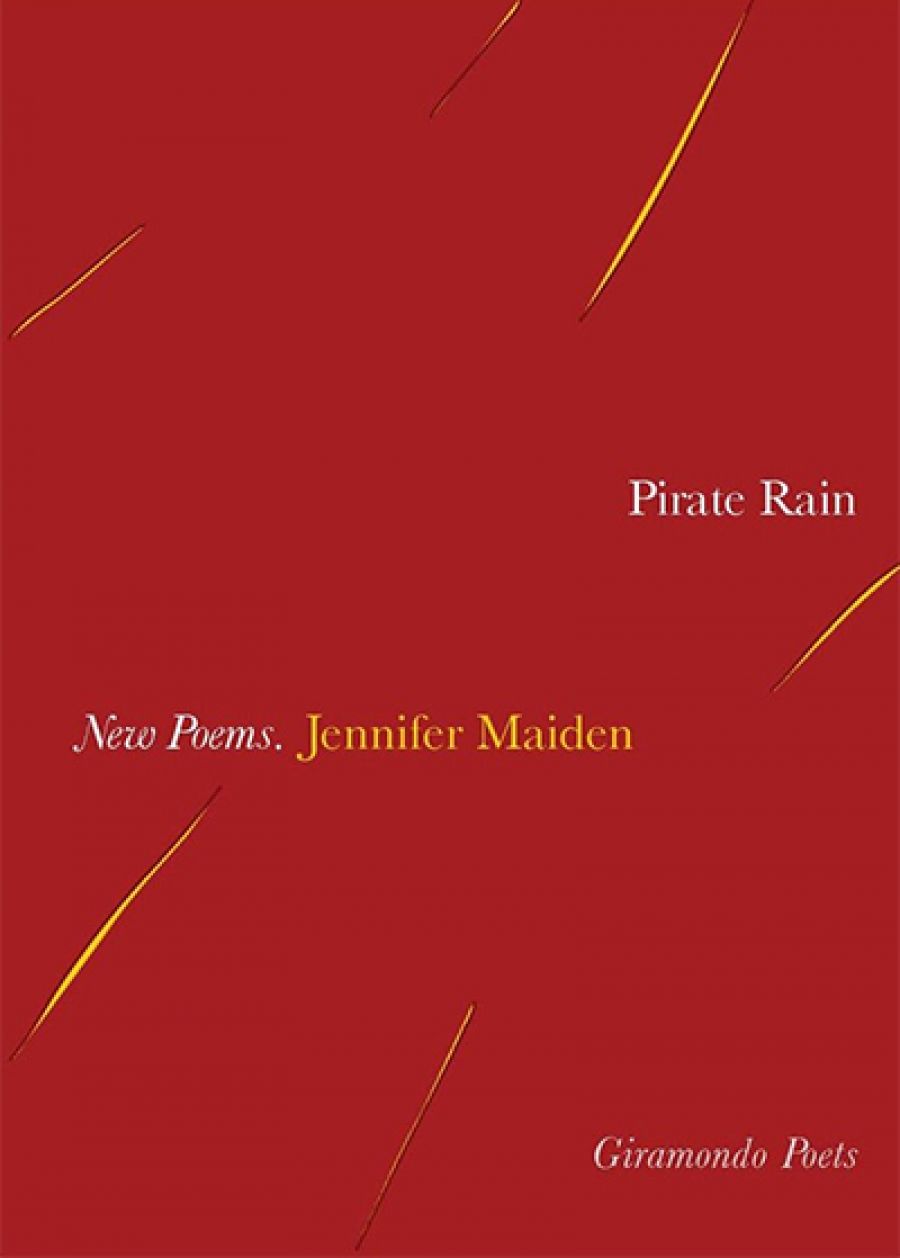
- Free Article: No
- Contents Category: Poetry
- Review Article: Yes
- Online Only: No
- Custom Highlight Text:
Jennifer Maiden is a great experimenter – in a specific sense. In a 2006 interview in The Age she said: ‘I have always found poetry a useful tool for tactical and ethical problem-solving … I suppose it’s a laboratory for testing out ideas.’ Maiden works from an ethical stance, but not, as some critics and readers have assumed, a facile leftist one (whatever ‘left’ means in the twenty-first century). The poems in this latest book are mainly discursive, and many address political situations, issues and, more specifically, public figures and personae.
- Book 1 Title: Pirate Rain
- Book 1 Biblio: Giramondo, $22 pb, 89 pp
- Book 1 Readings Link: https://booktopia.kh4ffx.net/Qkaxz
In many poems, the personae wake up somewhere, ready to confront or be confronted by the endless mediated world of television and language spin.
George Jeffreys woke up in Beirut.
George
Bush Junior was on the TV, obsessed
as usual with Baghdad.
They move around the world – Rio, Beirut, New Orleans, a Somali pirate ship, Saigon (this is Graham Greene’s turn in the book) – continuing their discussions or solitary ruminations.
Maiden clearly knows how to work the dialogic. She has referred to her poetry as ‘three-dimensional philosophy’. As in previous books, such as Friendly Fire (2005), she invites the reader to regard her personae as poetic artifices through which she can explore her ideas. The poems themselves seem to be three- or many-dimensional as they move from diary-like (both as a form of musing in the nonce and a paratactical collection of events in the world) to meditation, dialogue and lyric. She presents a series of poems featuring her two wandering characters, George Jeffreys and his lover, Clare Collins, (both of whom first appeared in Maiden’s second novel, Play with Knives, 1990, and have been used to good effect, especially in Friendly Fire). We also get others – Eleanor Roosevelt and Hillary Clinton in particular – talking together, nicely ahistorical.
Maiden doesn’t offer simplistic, one-sided or bleeding-heart positions. In the poem ‘The Meat Vote’, Barack Obama and Sarah Palin are both pilloried. As Eleanor Roosevelt, in a fine anachronism, watches television, she sees a trigger-happy Palin gunning down a moose that:
… had the look
of most dying and dead
herbivores: polite,
puzzled, as if still trying to be
helpful …
while Obama jokes as he places his hands on: ‘a nice live cow in Chicago meatworks / to get the right wing vote …’ Here, Maiden’s version of Eleanor reflects: ‘Yes, Franklin enjoyed that at the last, how elite / liberals do an Armageddon best.’ Other poems stand alone, and many involve an address to her daughter, Katharine.
Maiden examines public rhetoric as well as her own process of creating poetry – poetry as a proving ground of language and self. She is both observer and participant, and allows her own life to enter the poems. In one poem, ‘Diary Poem: Uses of Privacy’, Maiden writes that she does not ‘actually often / use a persona’, and goes on to say, ‘One needs the private voice / to balance a public terror, still’. This is slightly disingenuous, maybe deliberately so, as the private voice in a published work is not private. Maiden’s guises are often presented in intimate moments, alone or with another in a hotel room. But Maiden’s ‘you’, her ‘one reader’, now shares in these moments, events, of the poem. So, we question privacy; we are complicit. Maiden’s tactics of swerving between self and world push readers across boundaries.
The book opens with an almost shattering sonnet, ‘Positional Asphy-xia’:
Watching the second but not last massacre
by the Israelis in Qana, my daughter
hopes that the scores of dead children
died in their sleep, and I reassure her
hollowly, ‘Perhaps’, but I remember
Thredbo, where the Coroner said some victims
were alive at first, died later
of ‘Positional Asphyxia’. Families cradling
limp, lovely, livid Qana children say after
the bombing at first they heard them
crying under the concrete. Their asphyxia
in a tight compartment there perhaps is over,
while need to breathe safe air in a sealed nation
traps their enemy, trauma-rigid and forever.
While Maiden is not a formalist writer in any narrow sense, this poem works with a core rhyme, -er (and variants such as -ia) as the mostly enjambed lines keep the poem and its thought process spilling over and down the page, echoing the horror it confronts. Most of the other poems are less structured, some rather too loose, though generally they stay on track.
However, most of Maiden’s narratives and dialogues are compressed, almost cryptic, and this economy is the key to the collection’s flex and tension. This is another major collection from one of Australia’s leading poets: urgent, sophisticated and exhilarating.


Comments powered by CComment